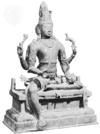- Shiva
-
/shee"veuh/, n. Hinduism."the Destroyer," the third member of the Trimurti, along with Brahma the Creator and Vishnu the Preserver.Also, Siva.[ < Skt: lit., the auspicious]
* * *
or SivaMajor deity of Hinduism, believed to have many manifestations.Like Vishnu, he is the subject of an elaborate and sometimes contradictory mythology. He is both the destroyer and the restorer, the great ascetic and the symbol of sensuality, the benevolent herdsman of souls and the wrathful avenger. His female consort is known under various manifestations, including Parvati, Durga, and Kali. In Shaivism he is worshiped as the paramount lord. Shiva, bronze statue, Madras, с AD 900.Courtesy of the Government Museum, Chennai; photograph, Royal Academy of Arts, London
Shiva, bronze statue, Madras, с AD 900.Courtesy of the Government Museum, Chennai; photograph, Royal Academy of Arts, London* * *
▪ Hindu deitySanskrit“Auspicious One” also spelled Śiwa or Śivaone of the main deities of Hinduism, whom Shaivas worship as the supreme god (see Shaivism). Among his common epithets are Shambhu (“Benign”), Shankara (“Beneficent”), Mahesha (“Great Lord”), and Mahadeva (“Great God”).Shiva is represented in a variety of forms: in a pacific mood with his consort Parvati (Pārvatī) and son Skanda, as the cosmic dancer ( Nataraja), as a naked ascetic, as a mendicant beggar, as a yogi, and as the androgynous union of Shiva and his consort in one body, half-male and half-female (Ardhanarishvara (Ardhanārīśvara)). As Bhairava, he is often depicted as a Dalit (formerly called an untouchable) and accompanied by a dog. He is both the great ascetic and the master of fertility, and he is the master of both poison and medicine, through his ambivalent power over snakes. As Lord of Beasts (Pashupati), he is the benevolent herdsman—or, at times, the merciless slaughterer of the “beasts” that are the human souls in his care. Although some of the combinations of roles may be explained by Shiva's identification with earlier mythological figures, they arise primarily from a tendency in Hinduism to see complementary qualities in a single ambiguous figure.Shiva's female consort is known under various manifestations as Uma, Sati, Parvati, Durga, and Kali; Shiva is also sometimes paired with Shakti (Shaktism), the embodiment of power. The divine couple, together with their sons— Skanda and the elephant-headed Ganesha—are said to dwell on Mount Kailasa in the Himalayas. The six-headed Skanda is said to have been born of Shiva's seed, which was shed in the mouth of the god of fire, Agni, and transferred first to the river Ganges (Ganges River) and then to six of the stars in the constellation of the Pleiades. According to another well-known myth, Ganesha was born when Parvati created him out of the dirt she rubbed off during a bath, and he received his elephant head from Shiva, who was responsible for beheading him. Shiva's vehicle in the world, his vahana, is the bull Nandi; a sculpture of Nandi sits opposite the main sanctuary of many Shiva temples. In temples and in private shrines, Shiva is also worshipped in the form of the linga, or phallus, often embedded in the yoni, the symbol of the female sexual organ.Shiva is usually depicted in painting and sculpture as white (from the ashes of corpses that are smeared on his body), with a blue neck (from holding in his throat the poison that emerged at the churning of the cosmic ocean, which threatened to destroy the world), his hair arranged in a coil of matted locks (jatamakuta) and adorned with the crescent moon and the Ganges (according to legend, he brought the Ganges River to earth from the sky, where she is the Milky Way, by allowing the river to trickle through his hair, thus breaking her fall). Shiva has three eyes, the third eye bestowing inward vision but capable of burning destruction when focused outward. He wears a garland of skulls and a serpent around his neck and carries in his two (sometimes four) hands a deerskin, a trident, a small hand drum, or a club with a skull at the end. This skull identifies Shiva as a Kapalika (“Skull-Bearer”) and refers to a time when he cut off the fifth head of Brahma. The head stuck to his hand until he reached Varanasi (now in Uttar Pradesh, India), a city sacred to Shiva. It then fell away, and a shrine for the cleansing of all sins was later established in the place where it landed.Wendy Doniger* * *
Universalium. 2010.
